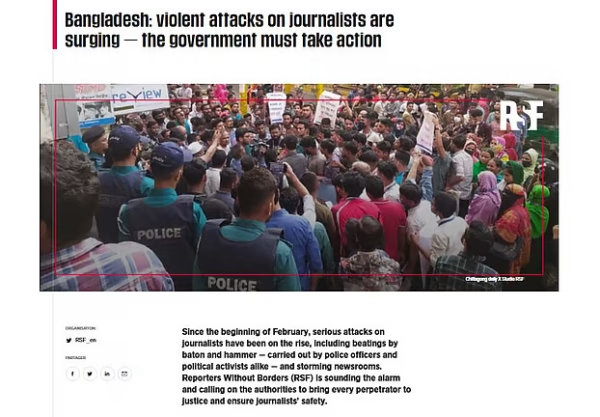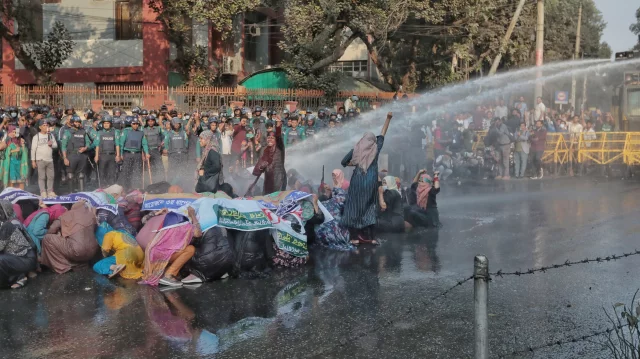Bangladesh’s press freedom has again been criticized by international observers due to Yunus government’s suppression and intimidation by its followers. According to the Reporters Without Borders (RSF), a number of journalists and media outlets came under attack in recent weeks at various places, but the incidents were largely underreported in the mainstream media due to reprisals.
Latest, the Chief Adviser’s press secretary, Shafiqul Alam, on Sunday threatened to document the reports of the journalists during the Awami League regime as well as the incumbent interim government, comprising civil society leaders and noted rights activists, that came to power after the fall of Sheikh Hasina on August 5.

An atmosphere of terror has been created for the journalists as well as common people due to arbitrary police actions and mob attacks on government critics and protesters raising any demand. The intimidation has increased since early February when the government supporters started violent attacks on houses and other establishments of the Awami League members, followed by the initiation of the Operation Devil Hunt.
The demand for a ban on the Awami League, arrest of its leaders and supporters and trial of the ones responsible for attacks on the rioters of the July-August anti-government movement also mounted since February 5.
The government-backed Jatiya Nagorik Committee and Students Against Discrimination as well as Inqilab Moncho are the forerunners of the radical movement who are also demanding that there will be no election before reforms and trial of the Awami League. They’re also campaigning against any form of sympathy towards the Awami League by political parties, the media and other quarters.
In these circumstances, it’s obvious that the authorities would consider any movement launched against the interim government decisions as being patronized by the Awami League. On Sunday, police said they picked up three protesters from a demonstration of the assistant primary school teachers who had been staging protests at Shahbagh for the last 11 days, demanding that their appointments be confirmed.

Before the detentions, which the police said were made to disperse the protesters, tear gas canisters were fired and water canons were used on them near the Education Building near the High Court. The same day, the apex court was set to hear a government appeal against an order that had cancelled the appointments of 6,500 assistant teachers from Dhaka and Chittagong divisions since the 60% women’s quota had not been in force anymore. However, the appointments of two more phases had not been challenged.
Police were also ruthless on the protesters on February 9, 13 and 15, as they used tear gas, water canons and baton charge at Shahbagh.
However, like in the previous instances, the media didn’t highlight the rationality of the demands let alone condemning police action. Instead, the media remains busy publishing the government’s statements and activities of its followers against the “fascist” Awami League.
The media has also orchestrated shameful and poor reporting on the Islamists barring the operation of a stall at the Amar Ekushey Book Fair selling sanitary napkins, spring festivals at various places, and sale of flowers on the Valentine’s Day.
The rise of Islamist extremism–provocative remarks and violence by jihadists, release of notorious extremists from jail and demands for withdrawal of cases against extremists–has also been underreported as it might undermine the interim government led by Nobel Peace Prize winner Prof Muhammad Yunus before the international community.

Yet, some people have ridiculed the government for the absence of women leaders in the much-talked conference of political parties with the government’s consensus commission on February 15 and thin presence of women at a political rally of the Jatiya Nagorik Committee’s women’s unit at Shahbagh on February 16.
The Shahbagh rally drew fewer crowd and the low turnout of female students was very low even though it was organized by the government supporters to demand the trial of Sheikh Hasina and a ban on the Awami League.
A top leader of the Students Against Discrimination, Nusrat Tabassum, deplored the absence of women in post-Hasina decision-making process while speaking at the Shahbagh rally. Later at night, she posted a status on her Facebook condemning the Bangla Academy for the closure of the sanitary pad stall.


মন্তব্য করুন
মন্তব্য করার জন্য আপনাকে অবশ্যই লগইন করতে হবে।